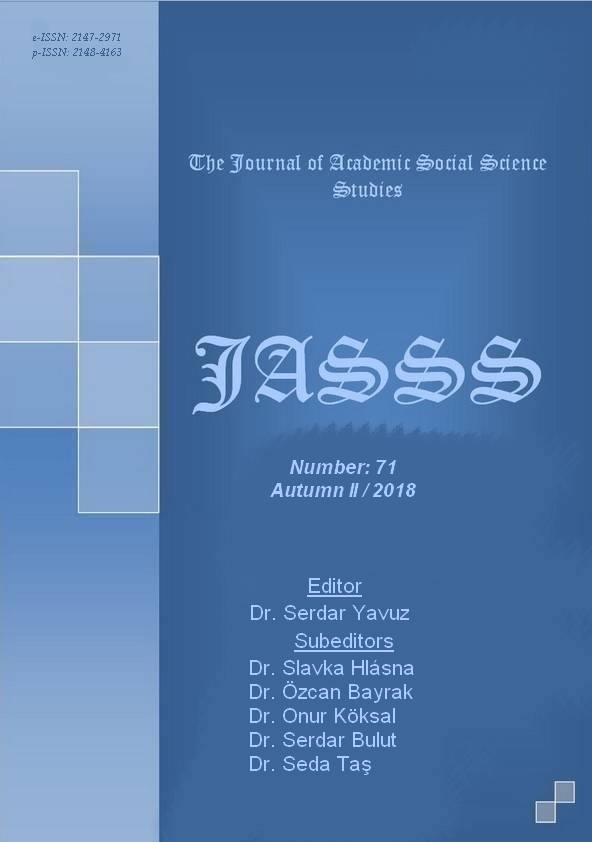KASIM 2000, ŞUBAT 2001 KRİZİ VE 2008 KÜRESEL KRİZİNİN TÜRKİYE EKONOMİSİ VE İSTİHDAMI ÜZERİNE YANSIMALARI
Author :
Abstract
Türkiye Kasım 2000 ve Şubat 2001 yıllarında yaşanan kriz dönemlerinin olumsuz etkilenerek 2001 yılından itibaren daralma dönemine girmiş ve bu daralma reel ekonomik göstergeler arasında olan işsizlik ve istihdam oranlarını da negatif etkilemiştir. 2001 yılında yaşanan daralmayla birlikte, krizin etkilerini en aza indirebilme adına orta vadeli program adıyla hem krizin reel ekonomiye etkilerini azaltmak hem de işsizlik ve enflasyon oranlarını dengede buluşturmak amaçlanmıştır. Bu gelişmeler karşısında ekonomide yaşanan olumlu havanın çok da uzun sürmediği bir döneme girilmiştir. 2001 kriz döneminin ardından ekonomide fiyat istikrarı ve enflasyon hedeflemesi kapsamında yapılan çalışmaların olumlu sonuçlarına rağmen 2001 yılında istihdam oranlarındaki artış gözden kaçmamaktadır. 2008 küresel finansal krizinin ABD, dünya ekonomileri ve Türkiye ekonomisi üzerindeki etkilerini göstermeye başlamasıyla birlikte Türk finans sisteminde de olumsuz etkileri hissedilmeye başlamış, dış kaynaklı kredilerin daralması sonucunda Türkiye’deki banka kredilerinde de daralmalar yaşanmasına sebep olmuştur. Dünyadaki hızlı sermaye akışıyla beraber Türkiye’de spekülatif sermaye girişlerinde artış yaşanmıştır. Aşırı spekülatif sermaye girişleriyle beraber Türkiye’de ekonominin olumsuz etkilenmesine yol açmıştır. 2002-2007 yılları arasında sermaye akışındaki artışın sonucu Türkiye’de artan likitide ekonomilerin iyiye gittiğini gösteriyor gibi görünse de 2008 yılına doğru ABD ve Avrupa kaynaklı talebin kısılması nedeniyle Türkiye’deki likidite bolluğunun dışa doğru çekilmesine, TL’nin diğer paralar karşısında değer kaybetmesine, cari açığın finansmanında kaynakların yeterli olmamasına, kişi ve banka kurumlarına olan güven endeksinin düşmesine neden olarak Türkiye’nin de krizden olumsuz etkilenmesine neden olmuştur. Çalışmada Kasım 2000- Şubat 2001 ve 2008 Finansal Krizin Türkiye ekonomisi üzerine reel etkileri ele alınarak istihdam değerleri üzerindeki yansımaları 1990-2018 yıllarına ait istihdam oranlarıyla değerlendirme yapılarak krizlerin etkileri ortaya konmaya çalışılmıştır.
Keywords
Abstract
Turkey in November 2000 and negatively affected by the crisis period in February 2001 entered into recession periods since 2001 and this contraction in real economic indicators were negative impact on the unemployment and employment rates. With the contraction experienced in 2001, it was aimed to reduce the effects of the crisis on the real economy and to bring the unemployment and inflation rates to balance with the medium term program in order to reduce the effects of the crisis. Against these developments, there has been a turning point in the positive atmosphere in the economy not taking much longer. Despite the positive results of the studies conducted under the scope of the price stability and the inflation targeting in the aftermath of the 2001 crisis period, the increase in the employment rates in 2001 is not out of sight. In 2008 the global financial crisis, the US, the world economy and Turkey's economy Turkish financial system are beginning to show their impact on began to be felt the negative effects of external credit contraction as a result of bank loans in Turkey has led to experiencing contractions. There has been an increase in speculative capital inflows in Turkey with the rapid flow of capital in the world. together with excessive speculative capital inflows have led to negative effects on the economy in Turkey. Between the years 2002-2007 as a result of the increase in capital flows in Turkey increased liquidity in the economy of the well to the show as it may seem, in 2008 towards the US and the abundance of liquidity in Turkey due to muted demand in Europe outsourced to the right to withdraw, Tl to depreciate against other currencies, current the lack of adequate sources of financing the deficit, people and banking institutions as to cause the index of confidence in Turkey has caused to be negatively affected by the crisis. Working in November 2000 and February 2001 and 2008 reflections on employment levels by considering the real effects of the Financial Crisis on Turkey's economy by making its assessment of the 1990-2018 year, the employment rate has sought to demonstrate the effects of the crisis.





